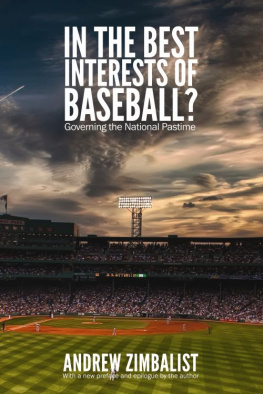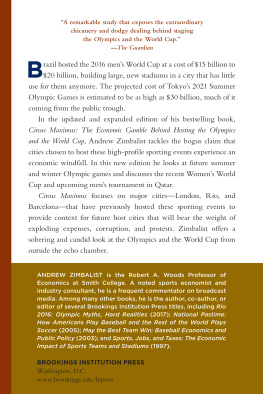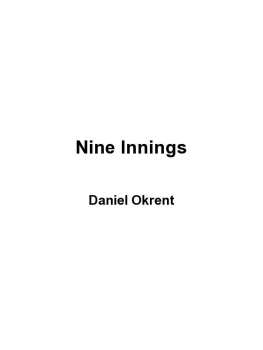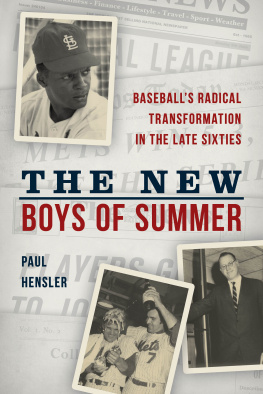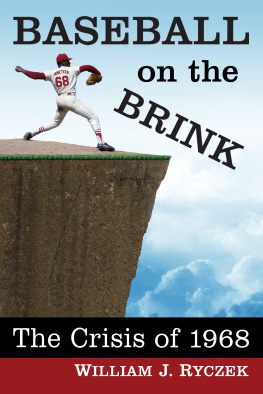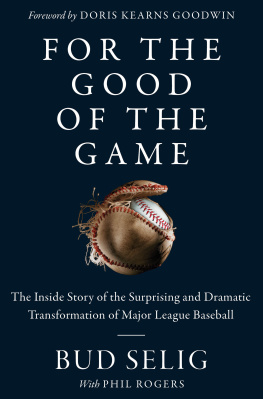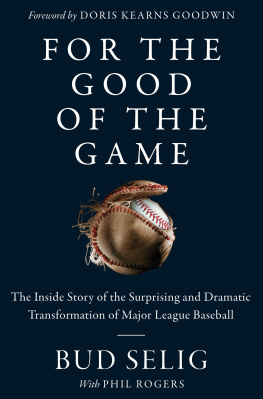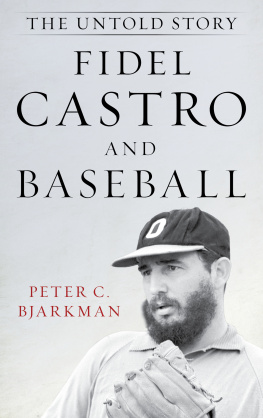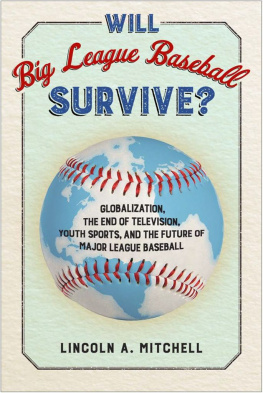Zimbalist is a consummate and impeccably credentialed outsider, and this splendid book is the real deal.... Rational baseball fans will rejoice in this tough but fair view of a decent man in a thankless job.John Thorn, editor of Total Baseball
A book certain to stir debate among sports business experts and fans alike.Boston Herald
Andrew Zimbalist has written an insightful and thought-provoking book that peels the cover off the ball of the position of the commissioner to see the threads inside.Maury Brown, Hardball Times
Andrew Zimbalist, a man who has become a go-to guy on matters of sports economics, uses an academic approach to explainand, perhaps surprisingly, defendBud Seligs 13-year tenure as commissioner of baseball.New York Daily News
I read In the Best Interests of Baseball? start to finish in one evening. Zimbalist has provided a tour de force. Its an incredibly interesting read that ends with a vision for the sport that is squarely on target and a clarion call to our industry.John Henry, principal owner of the Boston Red Sox and member of the MLB Executive Committee
For those who follow the often-depressing business of baseball, this makes thought-provoking reading.Alan Moores, Booklist
By looking at baseball from the perspective of the commissioners office and its many challenges, Professor Zimbalist has been able to use his scholars eye and his fans heart to see the game as an ongoing enterprise that needs refreshment. The fair but unsparing portrait of Bud Selig he paints is of a man who is nobodys fool, and nobodys toolnow, those of us who love the game need him to start the rally that will restore baseball in Americas esteem.Scott Simon, host of NPRs Weekend Edition Saturday and author of Jackie Robinson and the Integration of Baseball
Andy Zimbalists book is a thoughtful and objective analysis of baseballs labor and economic policy evolution. The book is interesting, relevant, and a good read.Randy Levine, president of the New York Yankees
In the Best Interests of Baseball?
Governing the National Pastime
Andrew Zimbalist
With a new preface and epilogue by the author
University of Nebraska Press
Lincoln and London
2006 by Andrew Zimbalist
Preface to the Nebraska Paperback edition and epilogue 2013 by Andrew Zimbalist
All rights reserved
Photo credits: Chicago History Museum, .
Library of Congress Cataloging-in-Publication Data
Zimbalist, Andrew S.
In the best interests of baseball?: governing the national pastime/Andrew Zimbalist, with a new preface and epilogue by the author.
p. cm.
Originally published: Hoboken, NJ: Wiley, 2006.
Includes bibliographical references.
ISBN 9780-803245358 (pbk.: alk. paper) 1. BaseballManagement. 2. Baseball commissioners. 3. Selig, Bud, 1934I. Title.
GV875.7.Z56 2013
796.357068dc23 2012035500
CONTENTS
Preface to the Nebraska Paperback Edition
Major League Baseballs constitution gives the commissioner broad powers to act in the best interests of baseball. Most would agree that the best interests of baseball are defined by maximizing the games popularity, and many believe that this is congruent with maximizing the games revenues. Problems arise because baseballs commissioner is hired by the thirty team owners, who have very different ideas about how to operate and grow the game.
Some large-market teams generate several hundred million dollars more a year than some small-market teams. Some teams own their own regional sports channel. Some play in stadiums that cost over $1 billion to build and others in venues costing less than $200 million. Yet all the teams must go to the same players market to fill their rosters.
Team owners, by their nature, are hypercompetitive. They also want their investments to be successful. And like the rest of us, team owners have different personalities and political preferences, and they seek out others who share their perspectives and needs.
The players too are organized, into a union. The union president has a desirable jobhigh paying, high profile, lots of perks. To get elected (and re-elected), the union president must please the players, which more often than not means pleasing the players agents, particularly the agents who represent a lot of players. It is reasonable to assume that these agents have considerable power over the union and that their primary goal is to maximize their own income.
Into this imbroglio steps baseballs commissioner. He must attend to all these constituents, plus the fans, the media, and the politicians. Good luck!
This book is about how baseballs nine commissioners have confronted this challengea challenge that has morphed and grown more complex over time. Each commissioner has had his failings, some more glaring than others. Bud Selig has been commissioner since 1992, and his current term goes through 2014; by then he will have served for twenty-three yearsas long as baseballs first commissioner, Kenesaw Mountain Landisand will have reached over eighty years of age.
Selig has presided over a particularly contentious, yet successful, period of baseball history. The owners have repeatedly voted to extend his term, suggesting that they cant imagine the game without his leadership. What has Seligs leadership meant to baseball and what will happen to the game after he steps down? The pages that follow attempt to answer these and other questions.
In the Best Interests of Baseball? was originally published in 2006. The current edition includes an epilogue that discusses developments in the baseball industry since 2005, including two new collective bargaining agreements (on which I worked as a consultant to Rob Manfred, baseballs vice president for labor relations) extending the sports labor peace that has held since 1995, the redesign of revenue sharing, tumultuous franchise sales and ownership turnover, new stadium construction, the development and maturation of mlb.com and the MLB Network, the explosion of television contracts and structural shifts in the delivery of video programming, and the new format for the postseason, among other transformations. The epilogue also anticipates what lies ahead for our national pastime.
To my wife,
Shelley Abend Zimbalist,
with abounding love and admiration
PREFACE
I first met Bud Selig in December 1992 in the chambers of the United States Senate. He had been named chair of the executive council (aka acting commissioner) three months earlier. We were both seated, listening to former commissioner Fay Vincent testify on baseballs antitrust exemption before Senator Howard Metzenbaums Committee on the Judiciary. Bud and I were waiting to testify. At one point, I turned around and asked him a question. He answered briefly, and then, moments later, he tapped me on the shoulder and said that he would love to talk to me about the baseball business and that he would do it anytime, anywhere, even in Northampton, Massachusetts. It sounded like a good offer. George W. Bush, then an owner and managing partner of the Texas Rangers, showed up a little later and sat behind Bud. Bushs father, of course, was president of the United States at the time.
I next met Bud the following summer at the evening gala before the All-Star Game at Camden Yards in Baltimore. USA Today held a forum on labor relations in baseball the day before the game. USAs executives had invited me, along with Don Fehr, Dick Ravitch (the owners chief negotiator at the time), Ken Burns, Bob Watson, and Bob Costas, to participate on the panel. I brought my two sons, Jeffrey and Michael, along to experience all the hype of the events. That night we went to the galaa massive outdoor party with dozens of tents, each filled with baseball-themed activities, full-service bars in each tent, and cocktail waitresses serving soft-shelled crabs, among other delicacies. Bud was at the gate greeting all the guests. I introduced him to my sons; he was as engaging and gracious as anyone could ask.
Next page
